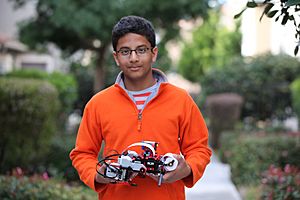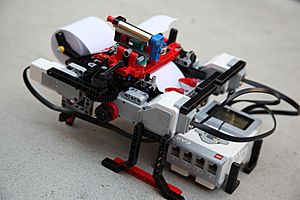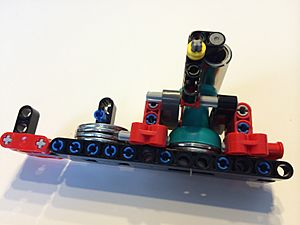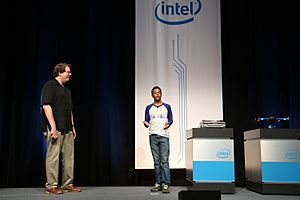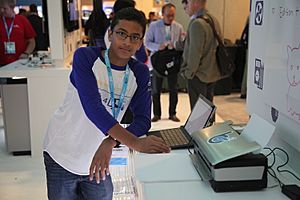Braigo facts for kids
Braigo is a special printer that helps people who are blind read. It prints words in Braille, which is a system of raised dots they can feel with their fingers. The name "Braigo" comes from "Braille" and "Lego" because the first version was made using Lego Mindstorms EV3 parts! A clever 13-year-old boy named Shubham Banerjee created Braigo in 2014 for a school science fair.
Shubham wanted to make a Braille printer that was much cheaper than the ones usually sold. His first Braigo printer cost about $350, while other Braille printers often cost over $1,900. This big difference in price meant more people could afford a Braille printer.
In 2014, a company called Braigo Labs Inc. was started in Palo Alto, California. Since Shubham was still a kid, his mom, Malini, became the company's president. Later that year, Shubham showed off a new and improved version, "Braigo v2.0," at a big event called the Intel Developers Forum.
Contents
The Inventor: Shubham Banerjee
Shubham Banerjee was 13 years old when he invented Braigo. He was born in Hasselt, Belgium, and moved to California in the United States when he was four. He lived in Santa Clara, California with his parents and younger sister while he was going to school.
Braigo v1.0: The Lego Printer
Shubham noticed that assistive technologies, like Braille printers, were often very expensive. He learned that many visually impaired people, especially in developing countries, couldn't afford them. He wanted to create a low-cost solution that people could even build themselves.
He used his love for Lego and the Lego Mindstorms EV3 robotics kit to build his first Braille printer. He worked hard, building and taking apart seven different models before he found one that worked! This final model could print the six dots needed for Braille letters. He then programmed it to print all the letters from A to Z.
Shubham used regular calculator paper to test his idea. He got great feedback from both sighted and blind people. His invention reduced the cost of a Braille printer by 82%!
Braigo v1.0 Becomes Open Source
Shubham decided to share his invention with everyone for free. He made the design and software for Braigo v1.0 "open source." This means anyone can use, change, and share the design. He uploaded building instructions to his YouTube channel and the software files to the Lego Mindstorms EV3 community page. He hoped that sharing his work would inspire others and help many visually impaired people around the world.
Braigo v2.0: The Next Step
On September 9, 2014, Shubham showed off Braigo v2.0 at the Intel Developer Forum. This new version was designed to be even better. It was meant to be quiet, lightweight, and affordable, so people could buy it easily. Braigo v2.0 uses new technology, including an Intel Edison chip, which is like a tiny computer brain.
After getting feedback from the visually impaired community, Shubham's goal was to make Braigo v2.0 a product that could be sold in stores.
Printing Documents to Braille on the Printer
In February 2015, Shubham showed a new way to print documents in Braille. He demonstrated how you could upload any document directly to the Intel Edison chip inside the Braigo printer. This means you wouldn't need to buy special software on your computer to change documents into Braille. This idea helps make the Braigo printer even more affordable to own.
Awards and Recognitions
| Year | What | From |
|---|---|---|
| 2015 | 2015 Next Generation of STEM Leaders | US News |
| 2015 | 2015 Invention Award | Popular Science |
| 2015 | 20 under 20 | Veckans Affärer |
| 2015 | 40 under 40 | Silicon Valley Business Journal |
| 2014 | Nominet Trust 100 Winner | Nominet Trust |
| 2014 | Technology Innovation of the Year | Trusted Reviews Time Inc. UK |
| 2014 | 25th anniversary of the Convention on the Rights of the Child | UNICEF publication "Reimagine the Future: Innovation for every child" |
| 2014 | Certificate of Recognition | California State Assembly Member Bob Wieckowski |
| 2014 | Best of America | Readers Digest |
| 2014 | Winner of 2014 Synopsys Outreach Foundation n+1 Prize | Synopsys Outreach Foundation, Inc. |
| 2014 | Lego Build 4 Good Challenge (Inspired by Braigo) - Seattle | Lego |
| 2014 | 2014 Youth Innovator Award | OPEN Silicon Valley |
| 2014 | NBC & AACI APA Heritage Month Honoree 2014 | NBC & AACI |
| 2014 | Special Congressional Recognition | Mike Honda |
| 2014 | Maker Faire Editor's Choice Ribbon | Maker Faire |
| 2014 | White House Maker Faire 2014 | White House |
| 2014 | The Queen Latifah Show & Lego Trophy | The Queen Latifah Show |
| 2014 | Honorable Mention | The Tech Awards |
Media Coverage
Television
Shubham and Braigo were featured on many TV shows. On February 21, 2014, CNN International interviewed him on "Quest Means Business." The host even wondered if Shubham would become "the next Steve Jobs, Bill Gates?"
NBC's "Bay Area Proud" program dedicated a full show to Shubham and Braigo on February 29, 2014. He was also named "Foot soldier of the week" on MSNBC's "Melissa Harris-Perry" program. On June 23, 2014, Shubham appeared on The Queen Latifah Show, where Queen Latifah surprised him with a special award from Lego.
Radio
Shubham was also interviewed on radio shows. On February 22, 2014, CBC Radio's "As it Happens" and NPR both aired interviews with him about his Lego Braille printer.
Creation of Braigo Labs Inc.
In August 2014, Braigo Labs Inc. was officially formed. Shubham announced he was working on Braigo v2.0. Since he was a minor, his mother, Malini Banerjee, became the company's President, with Shubham listed as the Founder. The company's office is in Palo Alto, California.
Intel Capital Investment
Intel, a big technology company, was very impressed with Shubham's work. At the Intel Developer Forum in 2014, Intel announced they would invest in Braigo Labs Inc. to help bring the printer to market. This investment was confirmed at the Intel Capital Global Summit 2014.
Youngest Entrepreneur to Receive Venture Capital Funding
On November 4, 2014, Intel Capital announced their investment in Braigo Labs Inc. News outlets reported that Shubham Banerjee, at just 13 years old, became the youngest person ever to receive venture capital funding for a startup in Silicon Valley. This was a huge achievement, showing how much belief there was in his invention.
Microsoft Relationship
Shubham was invited by Microsoft to their Student Tech Fair in New York City in May 2015. After the event, Microsoft announced that Shubham was working with their Windows team. The goal was to make it easy to use Braigo with Windows 10, so the printer could be easily set up and used by many people.


